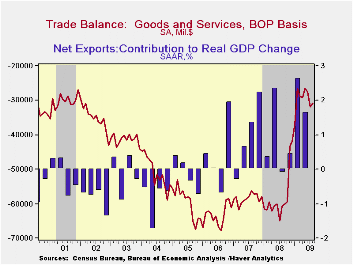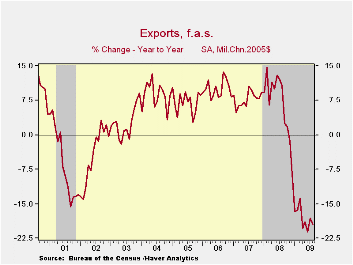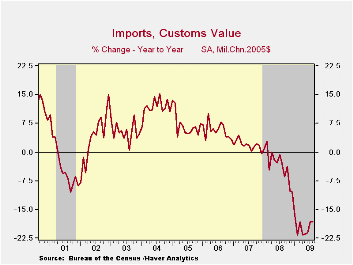 Global| Oct 09 2009
Global| Oct 09 2009U.S. Trade Deficit Narrows Slightly But Petroleum Imports Drop Sharply
by:Tom Moeller
|in:Economy in Brief
Summary
Though oil prices have risen, the recession in the U.S. economy has prompted a sharp cutback in the dollar amount of oil imports. That cutback helped the international trade deficit to narrow during August to $30.7.0B versus a little- [...]
 Though
oil prices have risen, the recession in the U.S. economy has prompted a
sharp cutback in the dollar amount of oil imports. That cutback helped
the international trade deficit to narrow during August to $30.7.0B
versus a little-revised July deficit of $31.9B. Consensus expectations
had been for a deeper August deficit of $33.0B.
Though
oil prices have risen, the recession in the U.S. economy has prompted a
sharp cutback in the dollar amount of oil imports. That cutback helped
the international trade deficit to narrow during August to $30.7.0B
versus a little-revised July deficit of $31.9B. Consensus expectations
had been for a deeper August deficit of $33.0B.
During August, oil imports were cutback by 5.7% m/m and have declined by more than one-half y/y due to lower prices. Moreover, the recession part of the story was clear: Imports of petroleum products in constant dollar terms fell 10.4% and were down 13.8% y/y. The decline in petroleum imports occurred despite higher crude oil prices. Prices rose to an August average of $64.75 per barrel versus the February low of $39.22.
The recession's influence also was apparent in
nonoil imports which ticked lower by 0.1% but were down by 19.7% y/y.
Real non-auto consumer goods imports fell by 1.9% (-16.3% y/y).
Non-auto capital goods imports slipped 0.3% after a strong July gain
and that left them off 19.9% from last year. Real automotive vehicles
& parts imports, however, were strong for the third strait
month.  They rose 8.4% but they still were off by one-quarter from last
year.
They rose 8.4% but they still were off by one-quarter from last
year.
Reflecting the competitive value of the dollar, real merchandise exports fell during August just 1.5% following three months of increase. Nevertheless, recessions abroad lowered real exports by 19.5% y/y. The chained dollar value of real capital goods exports led the August decline with a 4.2% drop (-23.9% y/y. Non-auto consumer goods exports fell a lesser 1.4% (-11.4% y/y) while auto exports rose for the third strait month (-28.9% y/y).
Imports of services fell 15.4% y/y as travel imports were off 7.8%, i.e., fewer U.S. residents went abroad, and passenger fares were off 24.7%. Exports of services fell 11.8% as travel exports fell 20.3% y/y and passenger fares fell by one-quarter.
 The
international trade data can be found in
Haver's USECON database. Detailed figures are
available in the USINT database.
The
international trade data can be found in
Haver's USECON database. Detailed figures are
available in the USINT database.
Monetary Policy Research and the Financial Crisis: Strengths and Shortcomings is today's speech by Fed Vice Chairman Donald L. Kohn and it is available here.
In the Wake of the Crisis is yesterday's speech by Fed Governor Daniel K. Tarullo and it can be found here.
| Foreign Trade | August | July | Y/Y | 2008 | 2007 | 2006 |
|---|---|---|---|---|---|---|
| U.S. Trade Deficit | $30.7B | $31.9B | $60.9B (8/08) | $695.9 | $701.4 | $760.4 |
| Exports - Goods & Services | 0.2% | 2.5% | -20.7% | 11.2% | 13.2% | 13.3% |
| Imports - Goods & Services | -0.6% | 4.9% | -28.6% | 7.6 | 6.0% | 10.8% |
| Petroleum | -5.7% | 3.3% | -51.9% | 37.0% | 9.4% | 20.1% |
| Nonpetroleum Goods | 0.3% | 6.4% | -24.6% | 1.5% | 4.8% | 9.1% |
Tom Moeller
AuthorMore in Author Profile »Prior to joining Haver Analytics in 2000, Mr. Moeller worked as the Economist at Chancellor Capital Management from 1985 to 1999. There, he developed comprehensive economic forecasts and interpreted economic data for equity and fixed income portfolio managers. Also at Chancellor, Mr. Moeller worked as an equity analyst and was responsible for researching and rating companies in the economically sensitive automobile and housing industries for investment in Chancellor’s equity portfolio. Prior to joining Chancellor, Mr. Moeller was an Economist at Citibank from 1979 to 1984. He also analyzed pricing behavior in the metals industry for the Council on Wage and Price Stability in Washington, D.C. In 1999, Mr. Moeller received the award for most accurate forecast from the Forecasters' Club of New York. From 1990 to 1992 he was President of the New York Association for Business Economists. Mr. Moeller earned an M.B.A. in Finance from Fordham University, where he graduated in 1987. He holds a Bachelor of Arts in Economics from George Washington University.
More Economy in Brief
 Global| Feb 05 2026
Global| Feb 05 2026Charts of the Week: Balanced Policy, Resilient Data and AI Narratives
by:Andrew Cates






